Thực trạng hoạt động, giải pháp nâng cao vai trò, và tính hiệu quả của Câu lạc bộ tiếng Anh trường Đại học Giao thông Vận tải thành phố Hồ Chí Minh
Trong những nỗ lực tìm kiếm phương thức giảng dạy mới nhằm nâng cao chất lượng
giảng dạy bộ môn tiếng Anh tại trường Đại học Giao thông vận tải Thành phố Hồ Chí Minh, tác giả đã
nhận ra vai trò không thể thay thế của câu lạc bộ tiếng Anh trong việc tạo ra một môi trường luyện tâp
và ứng dụng những kiến thức tại lớp vào môi trường giao tiếp thực tế hàng ngày. Nhưng làm sao để kích
hoạt hoạt động của câu lạc bộ hiểu quả nhất theo định hướng giáo dục cụ thể sẽ cần rất nhiều thời gian
nghiên cứu xây dựng một chương trình học tập ngoại khóa cụ thể và có hệ thống. Trong khuôn khổ của
bài viết này, tác giả sẽ tiếp cận thưc trạng và vấn đề hiện nay trong hoạt động của câu lạc bộ Tiếng Anh,
từ đó đưa ra những giải pháp nhằm nâng cao vai trò và ảnh hưởng của nó trong việc dạy và học tiếng
Anh tại Trường.
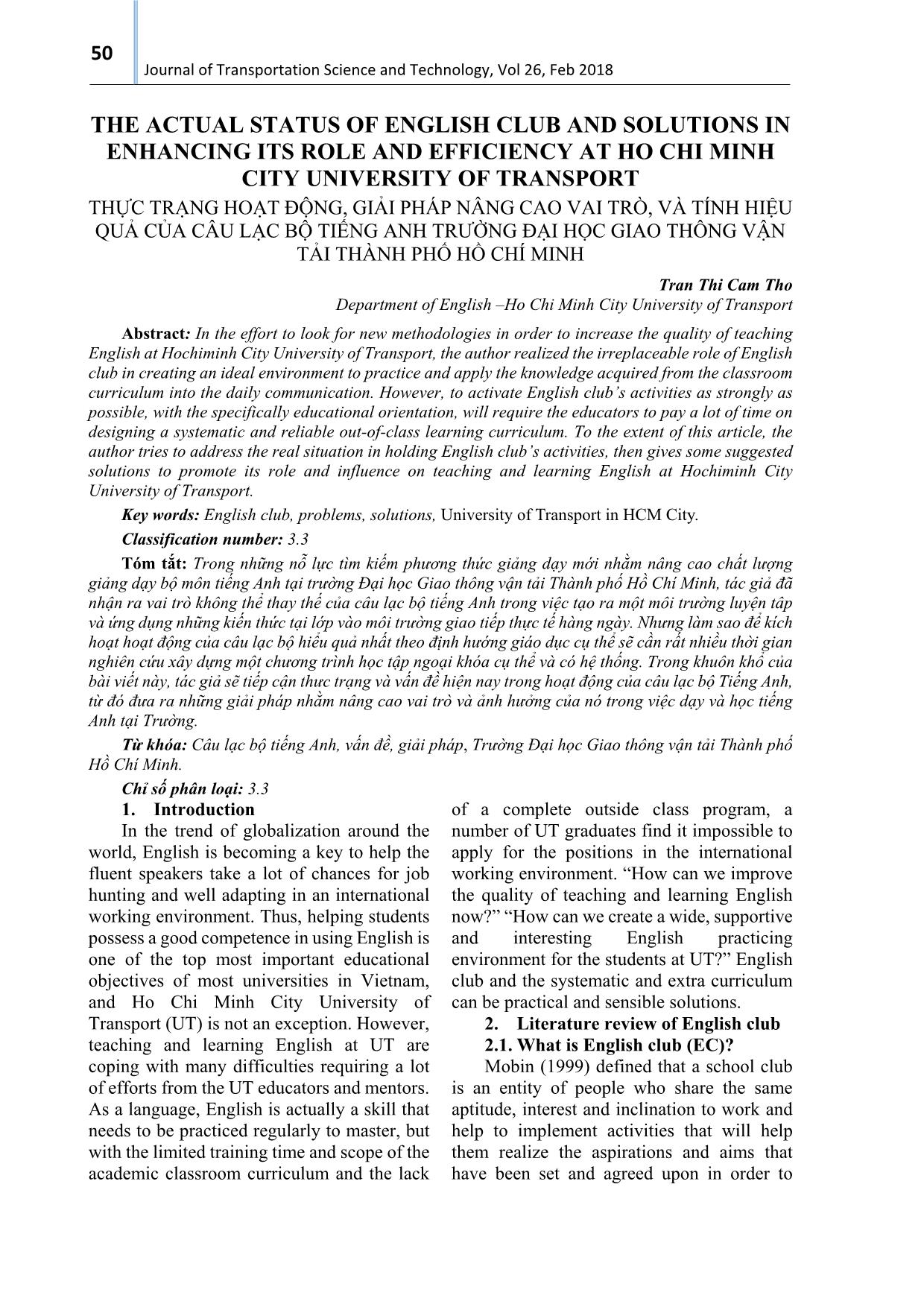
Trang 1
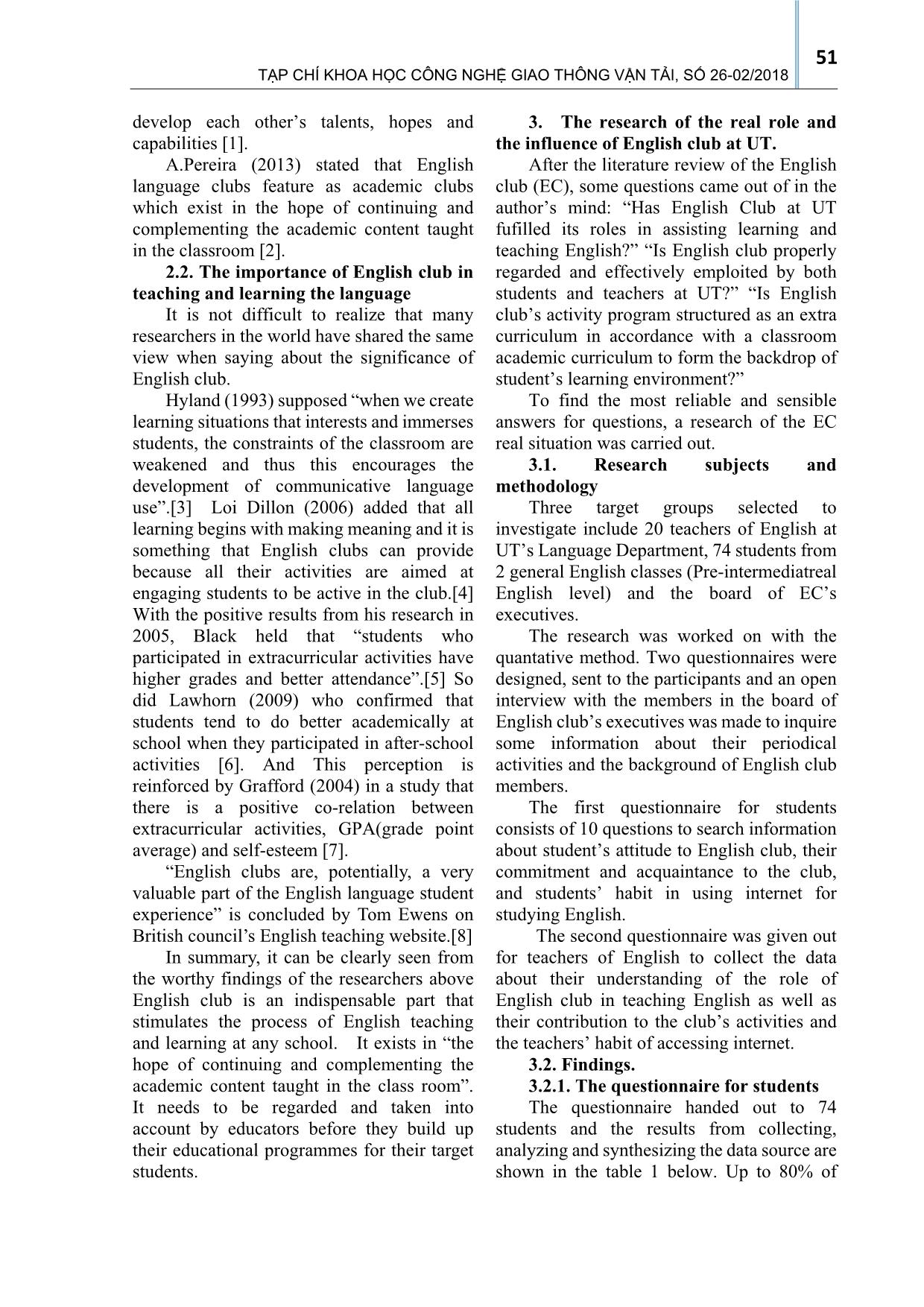
Trang 2
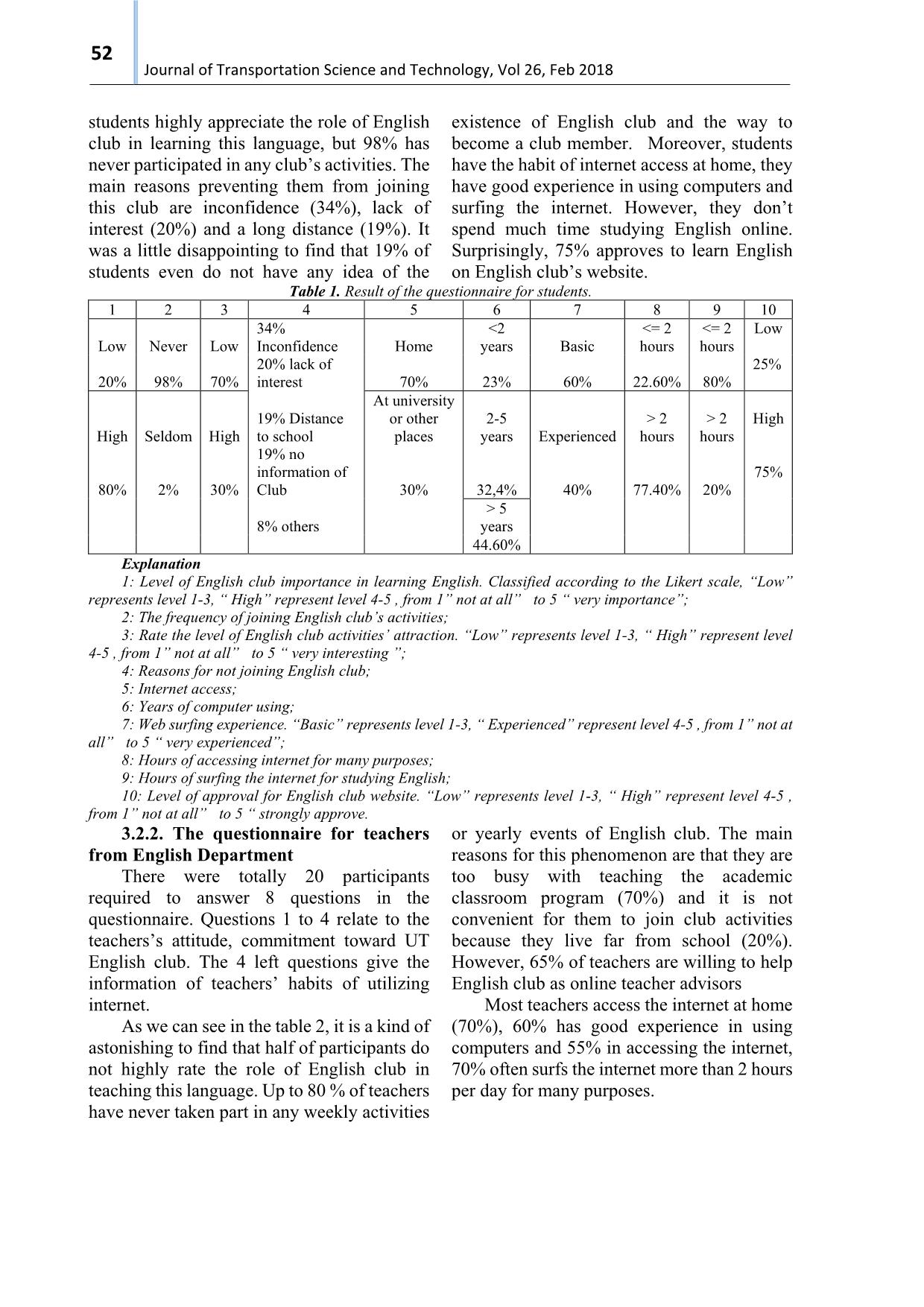
Trang 3
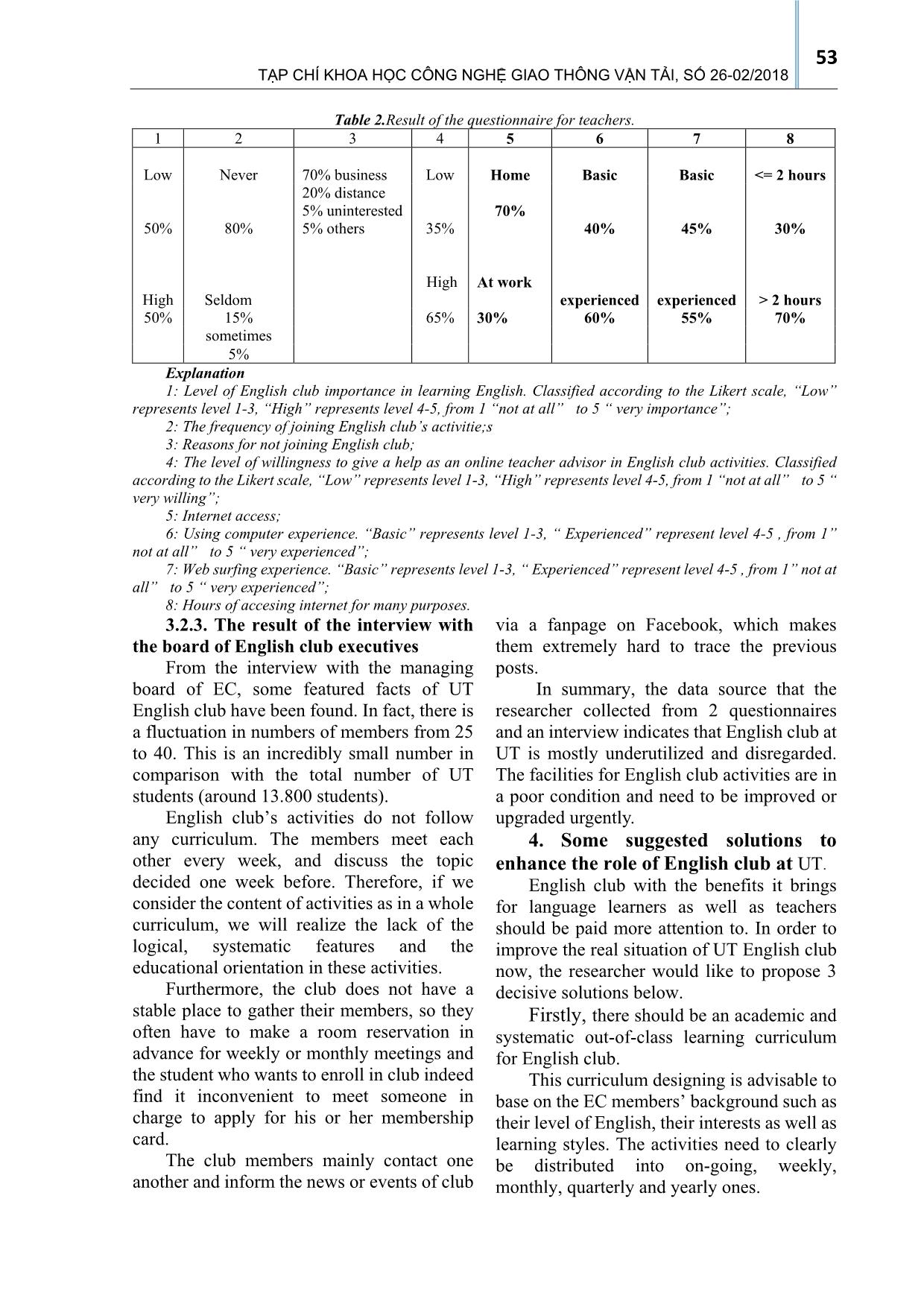
Trang 4
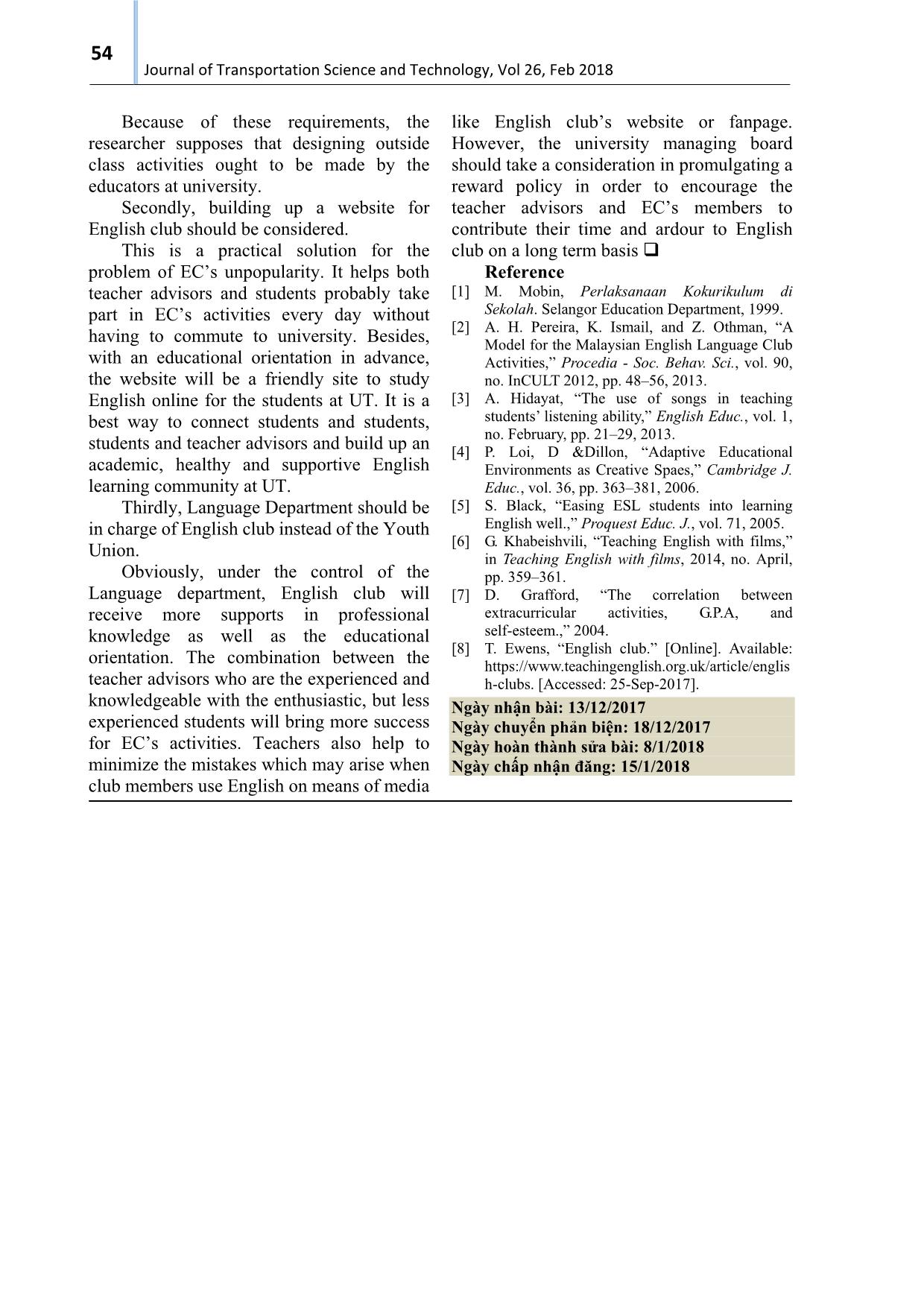
Trang 5
Tóm tắt nội dung tài liệu: Thực trạng hoạt động, giải pháp nâng cao vai trò, và tính hiệu quả của Câu lạc bộ tiếng Anh trường Đại học Giao thông Vận tải thành phố Hồ Chí Minh
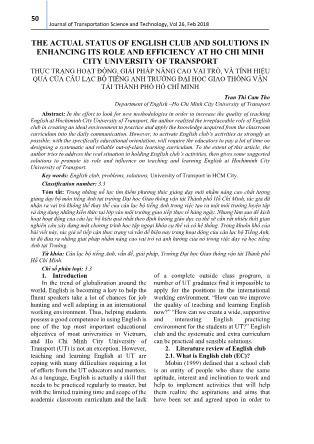
anguage, English is actually a skill that needs to be practiced regularly to master, but with the limited training time and scope of the academic classroom curriculum and the lack of a complete outside class program, a number of UT graduates find it impossible to apply for the positions in the international working environment. “How can we improve the quality of teaching and learning English now?” “How can we create a wide, supportive and interesting English practicing environment for the students at UT?” English club and the systematic and extra curriculum can be practical and sensible solutions. 2. Literature review of English club 2.1. What is English club (EC)? Mobin (1999) defined that a school club is an entity of people who share the same aptitude, interest and inclination to work and help to implement activities that will help them realize the aspirations and aims that have been set and agreed upon in order to TẠP CHÍ KHOA HỌC CÔNG NGHỆ GIAO THÔNG VẬN TẢI, SỐ 26-02/2018 51 develop each other’s talents, hopes and capabilities [1]. A.Pereira (2013) stated that English language clubs feature as academic clubs which exist in the hope of continuing and complementing the academic content taught in the classroom [2]. 2.2. The importance of English club in teaching and learning the language It is not difficult to realize that many researchers in the world have shared the same view when saying about the significance of English club. Hyland (1993) supposed “when we create learning situations that interests and immerses students, the constraints of the classroom are weakened and thus this encourages the development of communicative language use”.[3] Loi Dillon (2006) added that all learning begins with making meaning and it is something that English clubs can provide because all their activities are aimed at engaging students to be active in the club.[4] With the positive results from his research in 2005, Black held that “students who participated in extracurricular activities have higher grades and better attendance”.[5] So did Lawhorn (2009) who confirmed that students tend to do better academically at school when they participated in after-school activities [6]. And This perception is reinforced by Grafford (2004) in a study that there is a positive co-relation between extracurricular activities, GPA(grade point average) and self-esteem [7]. “English clubs are, potentially, a very valuable part of the English language student experience” is concluded by Tom Ewens on British council’s English teaching website.[8] In summary, it can be clearly seen from the worthy findings of the researchers above English club is an indispensable part that stimulates the process of English teaching and learning at any school. It exists in “the hope of continuing and complementing the academic content taught in the class room”. It needs to be regarded and taken into account by educators before they build up their educational programmes for their target students. 3. The research of the real role and the influence of English club at UT. After the literature review of the English club (EC), some questions came out of in the author’s mind: “Has English Club at UT fufilled its roles in assisting learning and teaching English?” “Is English club properly regarded and effectively emploited by both students and teachers at UT?” “Is English club’s activity program structured as an extra curriculum in accordance with a classroom academic curriculum to form the backdrop of student’s learning environment?” To find the most reliable and sensible answers for questions, a research of the EC real situation was carried out. 3.1. Research subjects and methodology Three target groups selected to investigate include 20 teachers of English at UT’s Language Department, 74 students from 2 general English classes (Pre-intermediatreal English level) and the board of EC’s executives. The research was worked on with the quantative method. Two questionnaires were designed, sent to the participants and an open interview with the members in the board of English club’s executives was made to inquire some information about their periodical activities and the background of English club members. The first questionnaire for students consists of 10 questions to search information about student’s attitude to English club, their commitment and acquaintance to the club, and students’ habit in using internet for studying English. The second questionnaire was given out for teachers of English to collect the data about their understanding of the role of English club in teaching English as well as their contribution to the club’s activities and the teachers’ habit of accessing internet. 3.2. Findings. 3.2.1. The questionnaire for students The questionnaire handed out to 74 students and the results from collecting, analyzing and synthesizing the data source are shown in the table 1 below. Up to 80% of 52 Journal of Transportation Science and Technology, Vol 26, Feb 2018 students highly appreciate the role of English club in learning this language, but 98% has never participated in any club’s activities. The main reasons preventing them from joining this club are inconfidence (34%), lack of interest (20%) and a long distance (19%). It was a little disappointing to find that 19% of students even do not have any idea of the existence of English club and the way to become a club member. Moreover, students have the habit of internet access at home, they have good experience in using computers and surfing the internet. However, they don’t spend much time studying English online. Surprisingly, 75% approves to learn English on English club’s website. Table 1. Result of the questionnaire for students. 1 2 3 4 5 6 7 8 9 10 Low Never Low 34% Inconfidence Home <2 years Basic <= 2 hours <= 2 hours Low 20% 98% 70% 20% lack of interest 70% 23% 60% 22.60% 80% 25% High Seldom High 19% Distance to school At university or other places 2-5 years Experienced > 2 hours > 2 hours High 80% 2% 30% 19% no information of Club 30% 32,4% 40% 77.40% 20% 75% 8% others > 5 years 44.60% Explanation 1: Level of English club importance in learning English. Classified according to the Likert scale, “Low” represents level 1-3, “ High” represent level 4-5 , from 1” not at all” to 5 “ very importance”; 2: The frequency of joining English club’s activities; 3: Rate the level of English club activities’ attraction. “Low” represents level 1-3, “ High” represent level 4-5 , from 1” not at all” to 5 “ very interesting ”; 4: Reasons for not joining English club; 5: Internet access; 6: Years of computer using; 7: Web surfing experience. “Basic” represents level 1-3, “ Experienced” represent level 4-5 , from 1” not at all” to 5 “ very experienced”; 8: Hours of accessing internet for many purposes; 9: Hours of surfing the internet for studying English; 10: Level of approval for English club website. “Low” represents level 1-3, “ High” represent level 4-5 , from 1” not at all” to 5 “ strongly approve. 3.2.2. The questionnaire for teachers from English Department There were totally 20 participants required to answer 8 questions in the questionnaire. Questions 1 to 4 relate to the teachers’s attitude, commitment toward UT English club. The 4 left questions give the information of teachers’ habits of utilizing internet. As we can see in the table 2, it is a kind of astonishing to find that half of participants do not highly rate the role of English club in teaching this language. Up to 80 % of teachers have never taken part in any weekly activities or yearly events of English club. The main reasons for this phenomenon are that they are too busy with teaching the academic classroom program (70%) and it is not convenient for them to join club activities because they live far from school (20%). However, 65% of teachers are willing to help English club as online teacher advisors Most teachers access the internet at home (70%), 60% has good experience in using computers and 55% in accessing the internet, 70% often surfs the internet more than 2 hours per day for many purposes. TẠP CHÍ KHOA HỌC CÔNG NGHỆ GIAO THÔNG VẬN TẢI, SỐ 26-02/2018 53 Table 2.Result of the questionnaire for teachers. 1 2 3 4 5 6 7 8 Low Never 70% business Low Home Basic Basic <= 2 hours 50% 80% 20% distance 5% uninterested 5% others 35% 70% 40% 45% 30% High Seldom High At work experienced experienced > 2 hours 50% 15% 65% 30% 60% 55% 70% sometimes 5% Explanation 1: Level of English club importance in learning English. Classified according to the Likert scale, “Low” represents level 1-3, “High” represents level 4-5, from 1 “not at all” to 5 “ very importance”; 2: The frequency of joining English club’s activitie;s 3: Reasons for not joining English club; 4: The level of willingness to give a help as an online teacher advisor in English club activities. Classified according to the Likert scale, “Low” represents level 1-3, “High” represents level 4-5, from 1 “not at all” to 5 “ very willing”; 5: Internet access; 6: Using computer experience. “Basic” represents level 1-3, “ Experienced” represent level 4-5 , from 1” not at all” to 5 “ very experienced”; 7: Web surfing experience. “Basic” represents level 1-3, “ Experienced” represent level 4-5 , from 1” not at all” to 5 “ very experienced”; 8: Hours of accesing internet for many purposes. 3.2.3. The result of the interview with the board of English club executives From the interview with the managing board of EC, some featured facts of UT English club have been found. In fact, there is a fluctuation in numbers of members from 25 to 40. This is an incredibly small number in comparison with the total number of UT students (around 13.800 students). English club’s activities do not follow any curriculum. The members meet each other every week, and discuss the topic decided one week before. Therefore, if we consider the content of activities as in a whole curriculum, we will realize the lack of the logical, systematic features and the educational orientation in these activities. Furthermore, the club does not have a stable place to gather their members, so they often have to make a room reservation in advance for weekly or monthly meetings and the student who wants to enroll in club indeed find it inconvenient to meet someone in charge to apply for his or her membership card. The club members mainly contact one another and inform the news or events of club via a fanpage on Facebook, which makes them extremely hard to trace the previous posts. In summary, the data source that the researcher collected from 2 questionnaires and an interview indicates that English club at UT is mostly underutilized and disregarded. The facilities for English club activities are in a poor condition and need to be improved or upgraded urgently. 4. Some suggested solutions to enhance the role of English club at UT. English club with the benefits it brings for language learners as well as teachers should be paid more attention to. In order to improve the real situation of UT English club now, the researcher would like to propose 3 decisive solutions below. Firstly, there should be an academic and systematic out-of-class learning curriculum for English club. This curriculum designing is advisable to base on the EC members’ background such as their level of English, their interests as well as learning styles. The activities need to clearly be distributed into on-going, weekly, monthly, quarterly and yearly ones. 54 Journal of Transportation Science and Technology, Vol 26, Feb 2018 Because of these requirements, the researcher supposes that designing outside class activities ought to be made by the educators at university. Secondly, building up a website for English club should be considered. This is a practical solution for the problem of EC’s unpopularity. It helps both teacher advisors and students probably take part in EC’s activities every day without having to commute to university. Besides, with an educational orientation in advance, the website will be a friendly site to study English online for the students at UT. It is a best way to connect students and students, students and teacher advisors and build up an academic, healthy and supportive English learning community at UT. Thirdly, Language Department should be in charge of English club instead of the Youth Union. Obviously, under the control of the Language department, English club will receive more supports in professional knowledge as well as the educational orientation. The combination between the teacher advisors who are the experienced and knowledgeable with the enthusiastic, but less experienced students will bring more success for EC’s activities. Teachers also help to minimize the mistakes which may arise when club members use English on means of media like English club’s website or fanpage. However, the university managing board should take a consideration in promulgating a reward policy in order to encourage the teacher advisors and EC’s members to contribute their time and ardour to English club on a long term basis Reference [1] M. Mobin, Perlaksanaan Kokurikulum di Sekolah. Selangor Education Department, 1999. [2] A. H. Pereira, K. Ismail, and Z. Othman, “A Model for the Malaysian English Language Club Activities,” Procedia - Soc. Behav. Sci., vol. 90, no. InCULT 2012, pp. 48–56, 2013. [3] A. Hidayat, “The use of songs in teaching students’ listening ability,” English Educ., vol. 1, no. February, pp. 21–29, 2013. [4] P. Loi, D &Dillon, “Adaptive Educational Environments as Creative Spaes,” Cambridge J. Educ., vol. 36, pp. 363–381, 2006. [5] S. Black, “Easing ESL students into learning English well.,” Proquest Educ. J., vol. 71, 2005. [6] G. Khabeishvili, “Teaching English with films,” in Teaching English with films, 2014, no. April, pp. 359–361. [7] D. Grafford, “The correlation between extracurricular activities, G.P.A, and self-esteem.,” 2004. [8] T. Ewens, “English club.” [Online]. Available: https://www.teachingenglish.org.uk/article/englis h-clubs. [Accessed: 25-Sep-2017]. Ngày nhận bài: 13/12/2017 Ngày chuyển phản biện: 18/12/2017 Ngày hoàn thành sửa bài: 8/1/2018 Ngày chấp nhận đăng: 15/1/2018
File đính kèm:
 thuc_trang_hoat_dong_giai_phap_nang_cao_vai_tro_va_tinh_hieu.pdf
thuc_trang_hoat_dong_giai_phap_nang_cao_vai_tro_va_tinh_hieu.pdf

